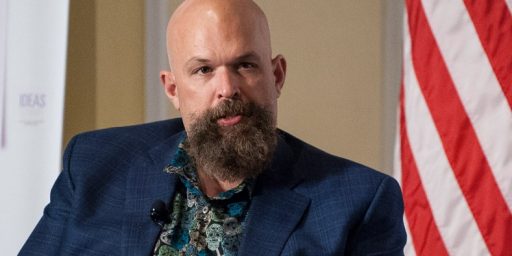KNOW-‘EM-ALL VS. KNOW-IT-ALL
Dr. Michael Segal, a neurologist and neuroscientist, argues in today’s WSJ that “President Bush is smarter than the intellectuals who disdain him.” He begins with an anecdote from Bush’s Yale days when he was able to rattle off the names of all 50 members of his pledge class and makes the following argument:
When intellectuals tell me how much they hate President Bush and how stupid they think he is, I know that he excelled at the crucial form of learning whose importance I didn’t fully appreciate when I was in college. It sank in only years later as I watched people in business do wonders by drawing on their personal relationships, much as scientists do wonders by marshaling knowledge that is more abstract. This focus on personal relationships may be the key to the president’s success–and to why so many intellectuals disdain him.
When Mr. Bush ran against John McCain in 2000 presidential primaries, the Arizona senator was quick on his feet and had a good answer for every question. The Texas governor, on the other hand, had a great team. Mr. McCain was the know-it-all; Mr. Bush was the know-’em-all. Both sets of skills are important, but the presidency is a job in which you can’t know everything about every issue or make things happen just by yourself. Being a good judge of people and having a great team is of huge importance.
To a typical intellectual, how much you know is far more important than knowing whom you can trust and count on. This is why Mr. Bush is so infuriating to intellectuals. He makes no pretense that he has all the answers, and he talks like a regular guy–but the team he leads is reshaping the Middle East with a brashness and vision equal to that of his Reaganite predecessors, as well as making major changes in domestic policy.Polls show that most Americans admire Mr. Bush’s personal qualities, but to intellectuals he doesn’t show the personal quality they most admire. Thus to them Mr. Bush’s successes seems undeserved, attributable to others. Although the president’s IQ is estimated (based on SAT scores) as greater than that of 90% of Americans, he is portrayed as the puppet of smarter men.
It’s hard to budge stereotypes, but Mr. Bush could use his talents at personal relationships to reassure intellectuals, emulating some of his predecessors. John F. Kennedy made a big show of inviting intellectuals to the White House, and President Clinton had widely publicized policy sessions with thought leaders while president-elect. These actions were crucial to cementing their reputations for wisdom. President Bush, through a series of lunches with a wide variety of thought leaders at the White House, could get across the message that being a know-’em-all is a great way to pool the wisdom of the community and channel it into wise policy. And I bet he’d have a lot of fun doing it.
There’s clearly something to this. There’s little doubt that great social skills–whether they are a form of “intelligence” or something else altogether—is a more important predictor of success than raw brainpower.






Not “more important.” Possibly “equally important,” but that’s all.
Could be. Anecdotally, I just know a lot of very smart people who aren’t all that successful because they tend to have weak social skills–and I know quite a few people of mediocre intellect that seem to get ahead because they “play the game” very well in a social sense.
Indeed, many if not most politicians are much more charming than they are smart. Those who have both skills in abundance–JFK, Reagan, and Clinton, e.g.–are rather rare.
Well, I was going to disagree with Kevin, but then I thought, “Who’s the richest guy in America right now?”
Bill Gates?
Well, his accomplishment in building Microsoft is arguably the result, not of any particular software-developing talent on his part, but his ability to create and then exploit his relationships with others, especially in the computer technology field.
Whoever actually developed DOS and Windows isn’t the richest guy in America, Bill Gates is. So I guess I’m disagreeing with Kevin after all.
If you want stunning evidence to support the argument that being measurably intelligent has little relevance to real world ability to work one’s way logically through a problem or argument, join a mensa members only discussion list.
Don’t ask me how I know.
I can’t believe this is even up for debate… A good sales person will earn more than the best philosopher or mathematician any day of the week.
Don’t worry, Kate, I won’t ask how you know. 😉
But I will ask whether, however it is you know this, you would agree with my own assessment of Mensans: “There are some monumental stupidities of which only genius is capable.”
I have good reason myself to distrust any attempt to have “the wise” solve the world’s problems — from what I’ve seen, they’re the ones causing them inj the first place.
I’ve only met two MENSA members. They were both idiots.
“I’ve only met two MENSA members. They were both idiots.”
I’ll acknowledge being an idiot for joining. Though, to be fair, the local group is pretty laid back and more intent on pickling their brain cells than showing them off.
But the lists are another matter entirely. Astonishing stuff. If my damned blog server ever gets back up, maybe I’ll delve into it.
—